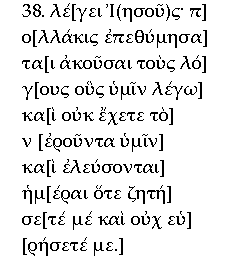Nag Hammadi Coptic Text  |
|
BLATZ (38) Jesus said: Many times have you desired to hear these words which I speak to you, and you have no other from whom to hear them. Days will come when you will seek me (and) you will not find me. |
LAYTON (38) Jesus said, "On many occasions you (plur.) have wanted to hear these sayings that I am saying unto you. And you have no one else to hear them from. Days will come when you will seek me, and you will not find me." |
DORESSE 43 [38]. Jesus says: "You have desired many times to hear these words which I say to you, but you could not find anyone else from whom to hear them. The days will come when you will seek me, and when you will not find me." |
Oxyrhynchus Greek Fragment  |
|
DORESSE - Oxyrhynchus "(only a few letters of this passage remain)." |
ATTRIDGE - Oxyrhynchus (38) [Jesus] said, "[Many times have you desired to hear these words of mine], and [you have no one else to hear (them) from. There will be] days [when you will look for me and will not find me]." |
Funk's Parallels
POxy655 38, Luke 10:23-24, Luke 17:22, Matt 13:10-17, John 7:32-36, Iren. Adv. Haer. 1.20.2.